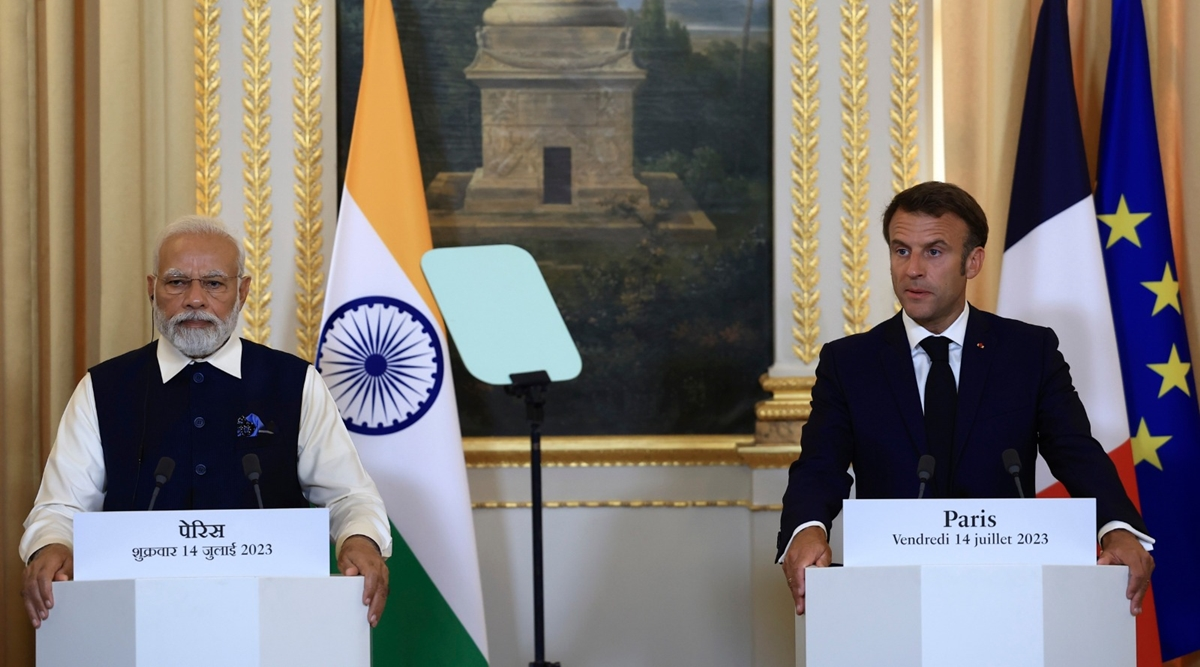Both countries have maintained significant relations in various sectors and are working towards achieving new heights in trade and economic relations.
Behind the buzz around the consecration of Lord Ram at Ayodhya on 22 January, there is the upcoming visit of the French President Emmanuel Macron as chief guest at India’s Republic Day parade. His proposed three-day visit to India is a sort of reciprocating the honour given to Prime Minister Narendra Modi as the chief guest on France’s national day on 14 July last year. This will be President Macron’s third visit to India since 2018, the last being in September 2023 for the G20 summit.
The invitation and swift acceptance of the same by Macron are reflective of the strong and deeply entrenched ties between New Delhi and Paris that have grown over the past few years. This honour is given to France, highest for any country, which has now been invited a record sixth time to be the chief guest at the R-day celebrations. Despite its significance, the visit might be overshadowed by the events in Ayodhya and underwhelmed in terms of agreements and substance that come out of it due to the visit of PM Modi to France six months ago as well as the impending general elections in a few weeks’ time. This risks the visit being mere symbolic and at best plays well for diplomatic niceties. Hence sceptics need to be proven wrong to come up with a visit that bores well with media coverage, substantial agreements, and action plans to further strengthen their relations.
This visit is special as India commemorates its 75th Republic Day, while France and India enter 26th year of their strategic partnership, launched interestingly on 26 January 1998 during the then French President Jacques Chirac’s visit as chief guest on R-day. This was India’s first-ever strategic partnership with any country that embodied the core vision of both the countries to enhance their respective strategic independence by drawing upon a strong and enhanced bilateral cooperation. Time has come for the relationship to leap forward beyond the usual suspects of defence, space, and civil nuclear cooperation. In July 2023, both leaders adopted a roadmap, “Horizon 2047: Charting the Future of India-France Strategic Partnership”, setting the course for the next 25 years.
Primary focus must be on increasing trade and investment between the two nations which is far below their respective potential. “The business and economic relationship is at an all time high with over 700 French companies that have an established presence in India employing over 450,000 people,” suggests Payal S. Kanwar, Director General, Indo-French Chamber of Commerce and Industry. The bilateral trade in goods between the two stands increased from $11.9 billion in 2018-19 to a mere $13.8 billion in 2022-23, accounting for less than 1.2% of India’s total trade. Whereas the bilateral trade in services is at $6.6 billion in 2022. France is India’s 11th largest foreign investor, with a cumulative investment of $10.8 billion between April 2000 and September 2023. The ongoing India-EU Free Trade Agreement negotiations can be a win-win scenario for both nations. In fact, it was under French presidency of the EU in January-June 2022, that the resumption of the India-EU FTA negotiations started after years of suspension. Besides trade, the two countries are successfully cooperating in the areas of smart cities, railways, tourism, food processing, AI, cybersecurity, and renewable energy.
Another area of burgeoning cooperation is higher education. There is an upward student
Looking back at the past 25 years of their strategic partnership, both countries have maintained significant relations in various sectors and are working towards achieving new heights in trade and economic relations. The unwavering support of France to India on various multilateral forums, be its support for the UNSC’s permanent seat, India’s bid for accession to the Nuclear Suppliers Group (NSG), Missile Technology Control Regime (MTCR) or positioning it as a key anchor in its Indo-Pacific strategy is a testament to this relationship which is built on trust and mutual respect for each other’s strategic concerns.
Moving forward towards the next 25 years of their partnership, the scope of collaboration between the two powerhouses is limitless. Both leaderships must seize this opportunity to review and chart out a roadmap to execute multitude of agreements they have created to deepen the relationship.
Dr Mohit Anand is Professor of International Business and Strategy at Emlyon Business School, France. Rajesh Mehta is a leading consultant and columnist working on market entry, innovation and public policy.

